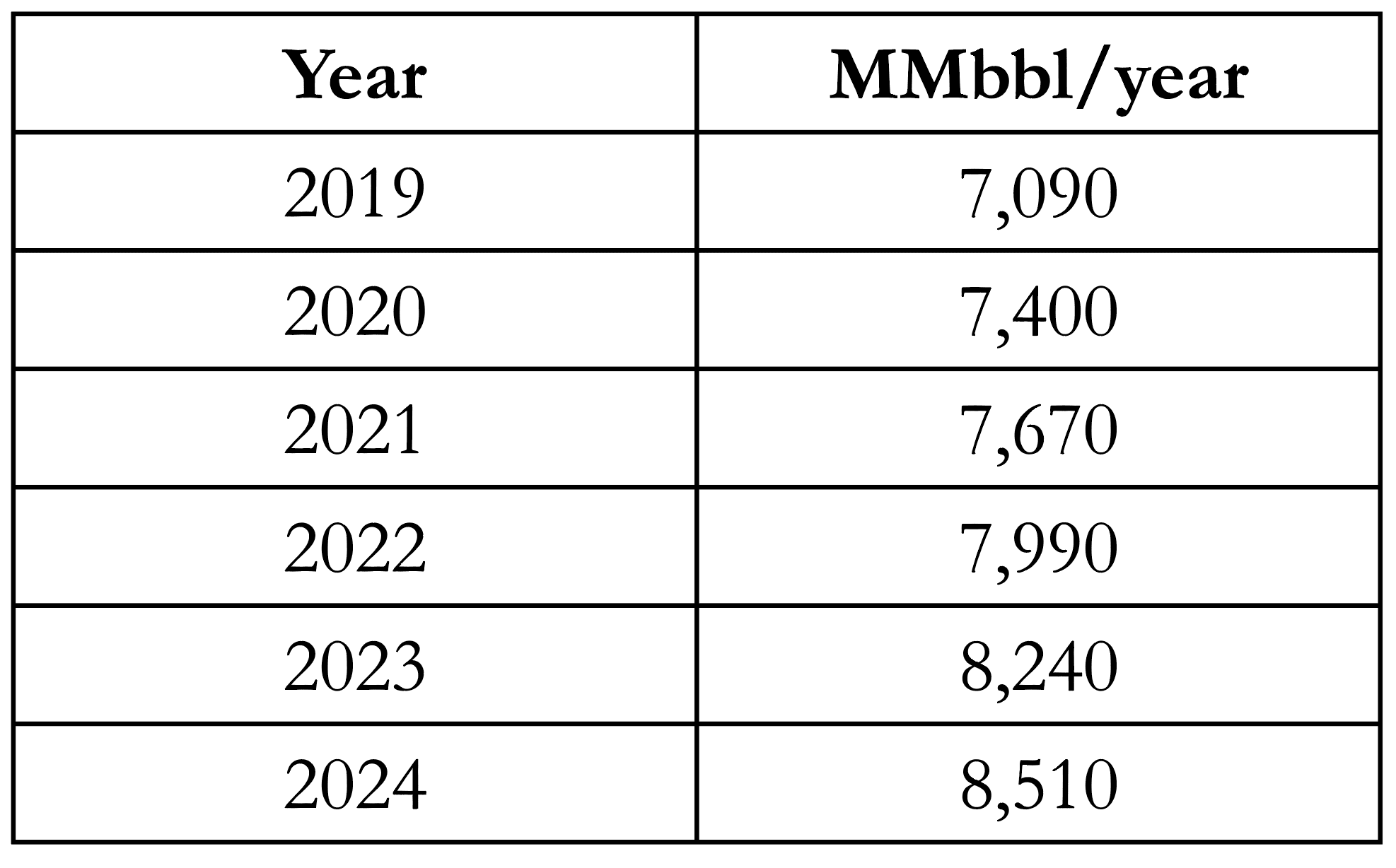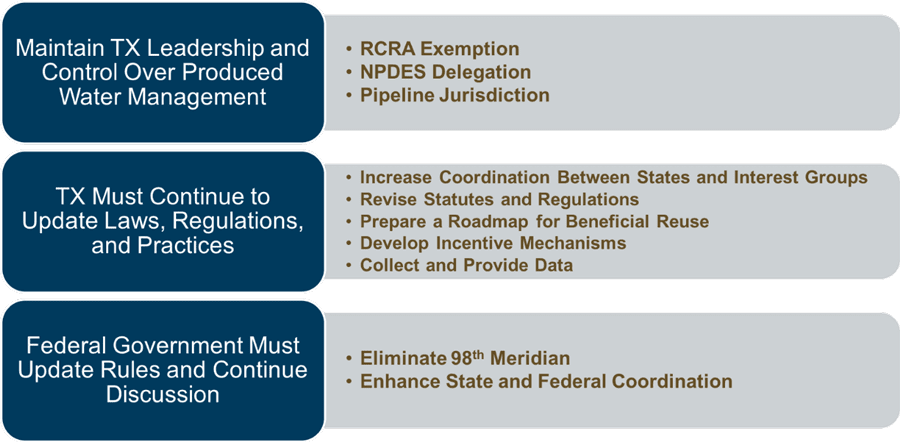Led by unconventional play development, the U.S. is closer than ever to energy independence. Texas plays a leading role in the current U.S. oil and gas boom. Yet Texas has a two-fold challenge born of this success: The state must source huge amounts of water for fracturing operations, often in arid, drought-prone areas. At the same time, it must manage billions of gallons of produced water from these onshore unconventional operations.
To maintain its oil and gas production capabilities, Texas must continue to make its signature strides in management of produced water and expand recycling and reuse opportunities. To this end, the Texas Alliance of Energy Producers (the Alliance) and the IPAA (Independent Petroleum Association of America) teamed up to publish the white paper: “Sustainable Produced Water Policy, Regulatory Framework, and Management in the Texas Oil and Gas Industry: 2019 and Beyond.”
The paper is a sequel to one we wrote in July 2014, “Sustainable Water Management in the Texas Oil and Gas Industry,” which was published by the Atlantic Council. The following factors drove our decision to update that paper:
- Data points to exponential increases in the amount of produced water that the industry will generate over the next five years. In the Permian Basin alone, produced water output will reach a level of 8.5 billion barrels of water by 2024. (See Table)
Table: Produced Water Projections to 2024 for the Permian Basin

Source: B3 Insight, 2019
- Texas has done many things right – including legislative and regulatory actions – to encourage safe and economic produced water reuse and recycling options. However, more remains to be done at both the state and federal levels.
- Produced water recycle and reuse is likely to increase as the midstream water management industry continues to mature, demand for fracturing water grows, freshwater and trucking costs increase, treatment costs decline, and injection capacity is constrained.
- Current and emerging treatment technologies can support cost-effective recycle and reuse in the oil and gas industry. However, no silver bullet technology exists that would replace the need to maintain disposal capacity. We report on factors that impact the costs of and availability to access saltwater disposal wells going forward.
Published on September 16, the white paper outlines 10 recommendations to encourage the economical and sustainable recycling and reuse of produced water. We hope this can serve as a model for other states. The report centers around three guiding principles related to state and federal policy and regulation:
- Texas must maintain leadership and control over produced water management;
- Texas must continue to update its laws, regulations, and practices; and
- The federal government must update its rules and continue discussions with its state partners.
10 Policy Recommendations for the Sustainable Use of Produced Water

Here are the 10 specific recommendations:
Maintain State Leadership and Control Over Produced Water Management:
- Preserve the RCRA (Resource Conservation and Recovery Act) exemption: The RCRA exemption gives Texas primary jurisdiction over produced water. The existing RCRA regulatory framework is the keystone for nearly all oil field waste management practices – and essential for expanding produced water management options. It is imperative that Texas preserve the RCRA exemption.
- Delegate NPDES (National Pollutant Discharge Elimination System) authority to Texas: Texas recently passed legislation that will lead to the consolidation of state authority for discharge permitting. The new law directs the TCEQ (Texas Commission on Environmental Quality) to seek delegation from the EPA for oil and gas wastewater discharge. Achieving this NPDES delegation – target timeline is 2021 – would simplify permitting and expand reuse options for produced water in Texas.
- Maintain Texas jurisdiction over pipelines: Texas regulates produced water pipelines via a comprehensive framework as well as state field employees who regularly inspect produced water operations and maintenance activities. The state currently has an all-time high of filled inspector positions with 69 pipeline safety inspectors and 170 oil and gas inspectors. Any federal usurpation of state oversight by agencies such as the PHMSA (Pipeline and Hazardous Material Safety Administration) would burden the recycling industry and add little value.
Continue to Update State Laws, Regulations and Practices: - Increase interstate and association policy coordination: Texas government and industry officials should participate in nongovernmental organizations with broad representation across the states to share best practices and other information. The eventual goal would be to standardize policy across the U.S. as much as realistically possible given the differences in local geographic conditions and state regulations. This can be accomplished through the auspices of the IOGCC (Interstate Oil and Gas Compact Commission), which gathers officials from across the country to meet regularly and discuss policy and issues. Other organizations such as the national GWPC (Groundwater Protection Council) should be supported as a vehicle for producing valuable research. In June 2019, the GWPC published a produced water report that will advance the conversation on hydrocarbon extraction management, regulations, and overall energy security.
- Revise produced water statutes and regulations: The oilfield regulatory framework in Texas is well funded by the state legislature, has modern and updated regulations, and is competently administered by accountable state regulators. Yet the midstream recycling industry is rapidly evolving. As scientific knowledge expands, technology progresses, and new facts are uncovered, Texas regulators must draft rules that keep pace with these advancements. The state has made strides here in the past several years. For instance, some recycling is now PBR (Permitted by Rule), a concept that has encouraged produced water recycle and reuse. On May 16, 2019, the U.S. House Subcommittee on Energy and Mineral Resources invited California, Ohio, South Dakota, and Texas to testify on hydraulic fracturing and state regulation of produced water. Alliance President John Tintera gave testimony that clearly demonstrated Texas’ impressive and effective regulatory framework, which is a model that could help other states address regulatory concerns.
- Prepare a roadmap for beneficial reuse outside the oil and gas industry: The industry should continue to advance the state of the art, hone its operations, and follow sound produced water management practices in the oilfield. Meanwhile, the government can encourage uses outside the oilfields by creating a roadmap of how to update regulations, sponsor research, and issue permits for pilot studies. Scientific research must be supported through a solid, repeatable funding mechanism.
- Develop incentive mechanisms: In the recent Texas legislative session, legislators voted against several bills that would have provided tax relief or tax credits for documented produced water recycling activities. For example, one bill that failed specified tax credits for desalters, including those handling produced water. These incentives would lower produced water treatment costs, facilitate higher recycle rates, and eventually lead to beneficial reuse of produced water. Legislators expressed interest in an interim study of incentives and economic impacts, which they should pursue and learn from for the next legislative session in 2021.
- Collect and provide public access to better produced water data: Standardized, statewide produced water data is needed to track water volumes and production activity. This information would also help communicate the value of produced water and the opportunities recycling represents. Texas should determine the best mechanisms to collect and publish this data in a way that is not onerous or costly to the industry. The industry itself should standardize produced water terminology, reporting, and disclosure.
Federal Government Agencies Must Update Rules and Work with State Partners: - Update or eliminate 98th Meridian policy: The 98th Meridian is an arbitrary geographic marker the EPA uses to separate discharge permitting under NPDES rules. The meridian bisects Texas into land roughly east or west of Dallas. Under the current federal regulatory scheme, onshore discharges east of 98th Meridian are typically not authorized. For onshore discharges west of 98th Meridian whose “produced water has a use in agriculture or wildlife propagation,” beneficial use permit applications may be considered. The EPA must eliminate or modify this federal regulatory contrivance. It is not reflective of the current technological advances in recycling or the need for site specific permit conditions independent of broad national controls.
- Institutionalize Texas and federal agency cooperation: Some states have been working with the EPA on memorandums of understanding, white papers, and other endeavors involving produced water. In May 2019, the EPA issued its own draft “Study of Oil and Gas Extraction Wastewater Management,” which will be finalized by year end. These efforts are laudable, and Texas should pursue similar opportunities to collaborate with the EPA and DOE.
Texas has created an environment where produced water is no longer just a waste; it can be a valuable resource. As the nation’s oil and gas leader, the state must vigorously defend its legislative and regulatory framework against federal oversight and evolve them as needed to promote the recycle and reuse of produced water. It’s time for the next generation of innovation, with careful consideration of these 10 recommendations.
Blythe Lyonsserves as a consultant to the Texas Alliance of Energy Producers, and was formerly a Senior Fellow with the Atlantic Council’s Energy and Environment Program.
John Tinterais the past President of the Texas Alliance of Energy Producers. He is the former Executive Director of the Texas Railroad Commission and is a regulatory expert and licensed geologist (Texas #325) with a thorough knowledge of virtually all facets of upstream oil and gas exploration, production and transportation, including conventional and unconventional reservoirs.
Kylie Wrightis a Senior Environmental Specialist with GAI Consultants, Inc., and is a former geologic consultant with the Texas Alliance of Energy Producers.




